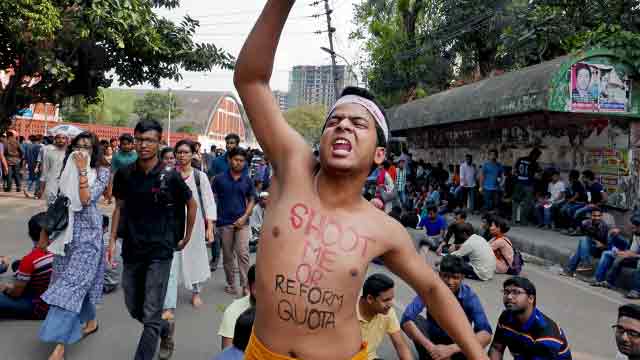Dhaka, Apr 21 (Just News): India reserves a share of jobs in government for people of particular castes. In Bangladesh, the dividing line is history. The ruling Awami League, which led the country’s independence movement, reserves 30% of public posts for descendants of those who fought in the war of secession from Pakistan in 1971 (a further 26% go to other groups). Students, who have been agitating for reform since February, want 90% of public posts to be awarded on merit. On April 11th Sheikh Hasina Wajed, the prime minister, faced with a spiralling series of demonstrations and sit-ins, appeared to accede to their demands, promising to abolish all the quotas. But there has been no official follow-up, and supporters of the quotas are now planning counter-demonstrations.
The anti-quota protests, suspended for now, first erupted on the campus of Dhaka University on April 8th. They quickly spread, gripping public and private universities across the country. In Dhaka, the capital, police used tear gas, batons and water cannons to disperse students and frustrated jobseekers. Hundreds were injured. The authorities’ heavy-handed response and the deployment of the Awami League’s thuggish student wing, the Bangladesh Chhatra League, only inflamed the protests. So did Matia Chowdhury, a firebrand student leader in the 1960s and now a cabinet minister, who said the protesters were the sons and daughters of those who collaborated with the Pakistani army in 1971. Students hacked government websites to post messages demanding quota reform.
Rashed Khan, one of the leaders of the protests, says they will resume if the government does not call off the prosecution of several of the students involved for vandalism. He claims plainclothes police stuffed him and two other leaders of the movement into a van, and handcuffed and blindfolded them, before releasing them without charge. “All political movements are banned in this country. We can be kidnapped at any time,” he complains.
Bangladesh has seen many “quota protests” in recent years. Only 44% of all public posts are filled on merit. Many students approve of the existing quotas for women (10%), religious and ethnic minorities (5%), the disabled (1%) and to ensure jobs for people from all parts of the country (10%). But they revile the system of favouritism and patronage built by the ruling party, of which the 30% quota is a centrepiece. The bureaucracy has issued some 250,000 documents certifying the bearer as a freedom fighter. Many recipients obtained them through bribery. Others use forgeries.
Bangladesh’s campuses are calm for now. Yet the dissent has evolved into a broad critique of the League’s entire approach to politics, which continues to sow divisions based on the events of 1971. The students are proving nimbler than a government led by ageing loyalists of the ruling family. One placard, referring to Sheikh Hasina’s generally revered father, the country’s founding president, read: “In Bangabandhu’s Bangladesh, discrimination will not be tolerated.”
Hossain Zillur Rahman, an economist based in Dhaka, suggests that an underlying employment crisis is increasing the protests’ potency. Although birth rates have plunged, two-thirds of Bangladeshis are under the age of 35. The government has promised to create 2m new jobs every year. But the workforce is growing much faster than jobs are being created. Youth unemployment exceeds 10%.
The simmering dissent comes as the Awami League, which has run Bangladesh for the past nine years, prepares for an election in December. Other political parties are in disarray. Sheikh Hasina’s bitter rival, Khaleda Zia, the leader of the Bangladesh Nationalist Party (BNP), the main opposition, is in jail. The BNP is not even sure if it will participate. Its electoral ally, the Jamaat-e-Islami, has been barred. The only plausible sources of dissent are the army and students. The question, says Debapriya Bhattacharya, an economist, is whether “we can still have an election whose result we cannot predict”. For the ruling party, the 23m newly eligible young voters since the last proper poll in 2008 must be a worry.-The Economist
(Justnews/ys/1350hr)





